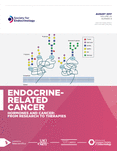Genetic variants in thyroid cancer distant metastases
- Steven E Justiniano1,
- Joseph P McElroy2,
- Lianbo Yu2,
- Ayse Selen Yilmaz2,
- Kevin R Coombes2,
- Leigha Senter3,
- Rebecca Nagy3,7,
- Paul Wakely Jr4,
- Stefano Volinia5,
- Michelle Vinco8,
- Thomas J Giordano8,9,
- Carlo M Croce6,
- Motoyasu Saji1 and
- Matthew D Ringel1,6⇑
- 1Division of Endocrinology, Diabetes, and Metabolism, The Ohio State University, Columbus, OH, USA
- 2Center for Biostatistics and Department of Bioinformatics, The Ohio State University, Columbus, OH, USA
- 3Division of Human Genetics, The Ohio State University, Columbus, OH, USA
- 4Department of Pathology, The Ohio State University, Columbus, OH, USA
- 5Department of Morphology, Surgery and Experimental Medicine, University of Ferrara, Italy
- 6Department of Molecular Virology, Immunology, and Genetics, The Ohio State University Wexner Medical Center and Arthur G. James Comprehensive Cancer Center, Columbus, Ohio, USA
- 7Guardant Health, Inc, Redwood City, California, USA
- 8Department of Pathology, University of Michigan, Ann Arbor, Michigan, USA
- 9Comprehensive Cancer Center, University of Michigan, Ann Arbor, Michigan, USA
- (Correspondence should be addressed to M D Ringel; email: matthew.ringel{at}osumc.edu)
Dear Editor,
Thyroid carcinoma is the most rapidly increasing solid tumor in the United States; although there has been a great emphasis on the analysis of primary tumors, predictors of both late-stage progression and response to therapy are more poorly defined due in part to the scarcity of progressive metastatic tissues. Therapeutic evidence of mixed responses in metastatic lesions and the limited available genomic data suggest that distant metastases in thyroid cancer are heterogeneous, driven by known oncogenes and other pathways that also might be therapeutic targets. We analyzed the genomes of a small number of rare surgically resected metastatic thyroid cancer lesions along with paired normal and primary tumor samples when available, in an effort to better characterize progressive distant metastases. The findings confirm the presence of mutations to known tumor drivers (BRAF and RAS) in metastatic samples. The results also identified the co-occurrence in predicted functional variants to the DNA damage repair (DDR) genes ATM and ERCC4 in metastatic lesions that did not show alterations of the MAPK pathway.
We examined the exomes of 19 samples (including 5 paired normal tissues) from 11 follicular cell-derived thyroid cancer patients with surgically resected distant metastases by custom exomeSeq (Supplementary Materials and Methods, see section on supplementary data given at the end of this article). Tumors with different histopathologies were included and were confirmed by an expert thyroid pathologist (PW). All patients were treated with TSH suppression, eight of them received I-131 therapy and none of them received chemotherapy or kinase inhibitors. Overall, 19,299 unique variants in the 682 genes and genomic regions were identified by an exomeSeq custom panel. We sought to identify rare, conserved, exonic variants that were likely to have functional effects. Thus, we focused on 1742 exonic variants in exons of sequenced genes. We excluded synonymous variants and …












